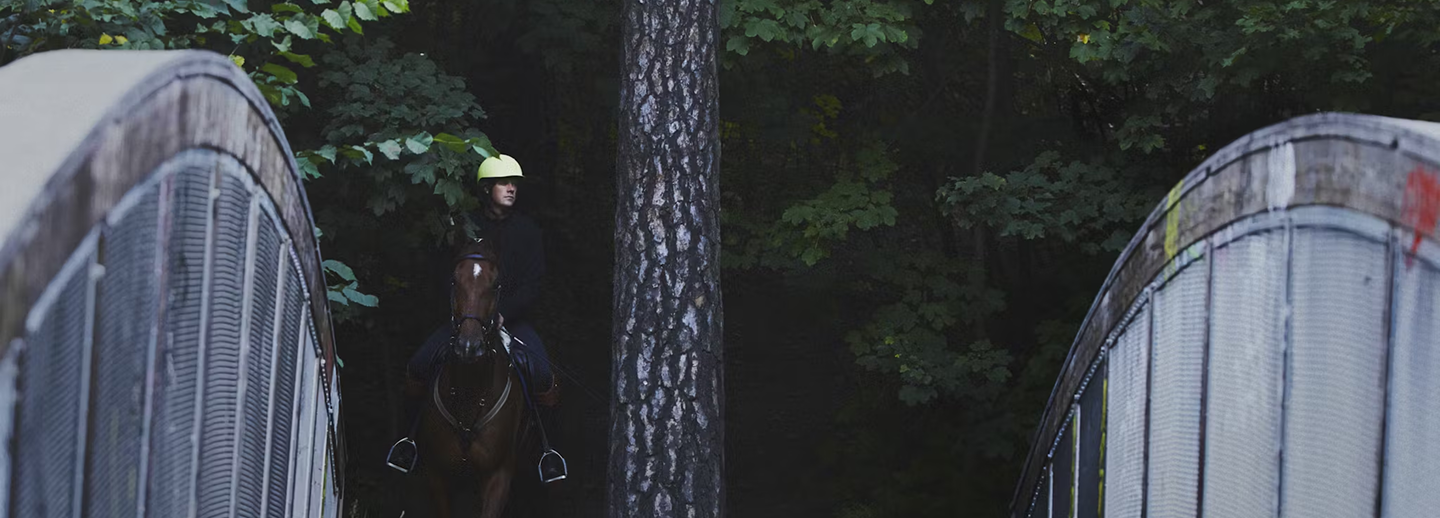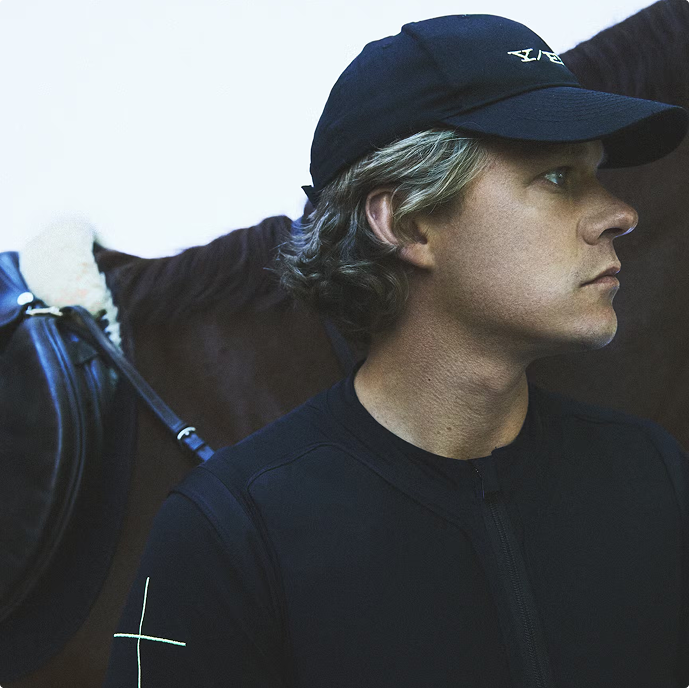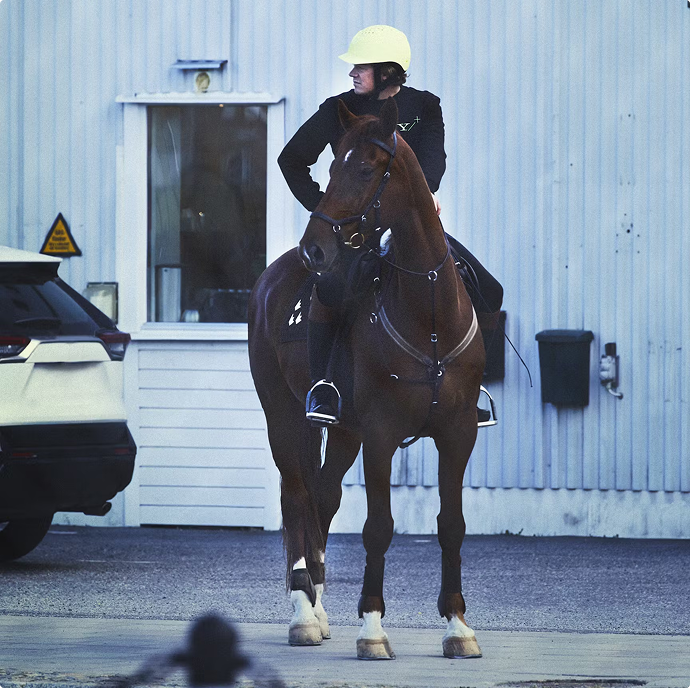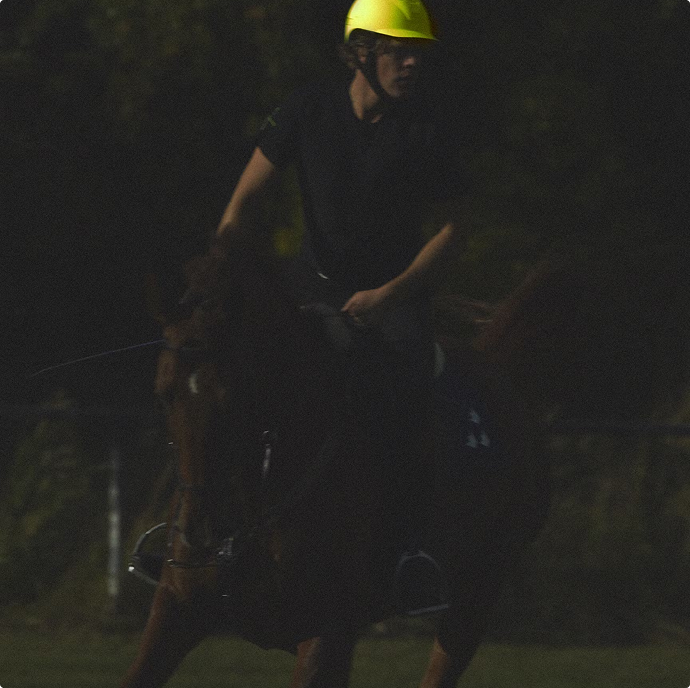
Y/ELM+ Protection's latest Pathfinder, Ludwig Svennerstål.
Ludwig is an experienced rider and a former Swedish National team member. He has represented Sweden at eight international senior championships since 2012 and brings valuable insights an ambitions to the Y/ELM+ community.
We are delighted to have him onboard and are very much inspired by people like him, who decide to go their own way.

The stable
Q ( 01 ) Hi Ludwig, what have you done today?
L: Hi, today we've been here in Stockholm shooting for Y/ELM+, a new equestrian safety brand.
Q ( 02) What is the philosophy of your stable?
L: The philosophy in my stable is that for the horses to perform, they need to be happy horses – and that is for the horses to have a good environment where they are let out in the field every day and they're allowed to be horses. Because if they can be themselves and happy I believe they can perform better.
Q ( 03 ) Are there any do’s and don’ts in the stable?
L: For me, a Do is definitely that the horses should be allowed access to the fields and that they have a regular routine. I think those are paramount factors in the stable to be successful.
You should always have the same people taking care of the horses, I think that's very important too. So they [the caretakers] can learn the horses and how to take care of them, and can recognize signs of what's normal and what's not not normal for every individual horse. I think those are the most important things for a horse to be happy and prevent injuries.
Q ( 04 ) Name one person your stable could not do without?
L: My farrier! I think it's super important for all horses to have good feet. One of the most important things overall is to have a sound horse. So I would say that my farrier is the most important person in my state.

Riding
Q ( 05 ) What is your idéa of good horsemanship?
L: I think good horsemanship is taking care of the horse, having a happy horse and letting the horse be a horse. I really think those are the key elements.
And I do think for us, as event riders, where we push both ourselves and our horses – letting the horses have a daily routine where they get to be outside in the field and eat grass and be happy and free is important to create balance.
Q ( 06 ) What is your best ride ever and why?
L: My best ride ever is when I rode the London Olympics in the Cross Country. Three years prior to that, I moved to England.
It was a big decision to leave my family and Stockholm, where I grew up with so many good friends and memories, to pursue a career, and really make the most I could in order to reach the Olympics.
It was really tough in certain aspects of my social life and so on. But when I rode the cross country, and I cleared with one second left of the time, it was really an amazing feeling. It was truly indescribable. All that work commitment came through and gave such a fantastic result! It was just remarkable!
Q ( 07 ) Worst fall, and how did you get back up in the saddle again?
L: I think I've been pretty lucky, I haven't really had any bad falls. But my worst fall, was, I think, when I was about 21. I rode in Berlin, in my first Five Star. and was a very, very wide boxer and I missed. I misread it and didn't really give the horse a good chance.
We fell and that was it. For me, It was more being brave enough afterwards to attack riding again – and ride at a certain pace to get back in the game. I managed to overcome the fear by training harder and really practicing riding fast again.
Q ( 08 ) What is your opinion on safety?
L: I think safety is very, very important. It's very important in every sport, but especially in equestrian sports, as we deal with live animals. I think it's paramount that we do everything we can to have the best safety equipment and systems we can.
I think it's also very important to have a safe horse. Unfortunately many people today don't have that. They have horses that are not safe nor suitable for their riding, and I see that as a problem, because it is just a matter of time before an accident will occur. It is a dangerous sport and we need to take both the animals and safety very seriously.

Personal
Q ( 9 ) When did you start riding?
L: I started riding when I was seven years old, actually here in Stockholm, in this table over there. *points to the stable*
In riding school, we started riding once a week. I was terrified of horses and for most of the first year I was just standing in the middle of the arena, so afraid of horses.
But gradually, I became more and more comfortable – and yeah, we’ve accomplished some fantastic things since.
Q ( 10) What does riding mean to you personally?
L: Riding means horses – and I think horses are the most fantastic animals. My parents rode even before I started riding school, so I grew up with horses. They've always been a huge part of my life.
The connection you have with a horse is something extraordinary, and I think that it puts a smile on your face – when you get that connection, and you achieve things together as a team.
Q ( 11 )What would you like to say to young people curious about writing but afraid to take the step to start?
L: Riding is hard, because you should have respect for animals. That's also partly why it's so rewarding. If you can trust yourself to trust the horse, you develop your own personality and you show to yourself that you can overcome things and that in itself is fantastic. But if you can also develop a connection with the horse that will bring you so much more life joy and happiness.
Q ( 12 ) You've been writing for a while now. What do you think are things you'd like to see changed in the writing culture?
L: I mean, riding has a lot of fantastic traditions, which partly makes the sport, but I also think that is a massive problem.
For example, I do eventing. It's a very dangerous sport, where sometimes because of tradition, people are not up-to-date with the current safety standards.
There are a lot more possibilities today, than just a few years ago – to stay safe. Especially when I think of the new helmets and safety equipment that is available in the market today.
I think it's should be every riders responsibility to absolutely do our best to always make the the sport as safe as possible, and develop the sport for the better. I think those are the key elements that I would like to see.
